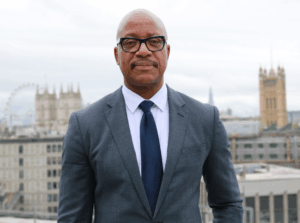Black History Month: London’s Director of Public Health on representative leadership
“Representation matters: your presence at the table changes the conversation, shapes better decisions, and inspires others to follow.”
This Black History Month, senior NHS London executives reflect on the importance of diverse representation within leadership teams, and the powerful influence this has on healthcare services across the capital.
Professor Kevin Fenton is the Director of Public Health in the Office for Health Improvement and Disparities for London and is well known for leading the capital’s response to the COVID-19 pandemic.
In his role, Kevin advises the Mayor of London, NHS, DHSC and wider government on health improvement, prevention, and tackling inequalities.
His journey into public health leadership has been driven by curiosity, resilience, and a desire to make a difference. From leading one of the world’s largest HIV and infectious disease programmes at Centre for Disease Control in the USA, to managing England’s HIV Action Plan, Kevin combines evidence, collaboration, and engagement with communities to bring about better health outcomes.
This Black History Month, Kevin shares what the theme, ‘Standing Firm in Power and Pride’, means to him, and his advice for Black healthcare leaders of the future.
Professor Kevin Fenton, Regional Director of Public Health, Office for Health Improvement and Disparities for London, said:
“Black History Month is always special to me. It’s a chance to honour those who came before us, to reflect on the struggles they overcame, and to celebrate the excellence and resilience of Black communities today. It reminds us to walk confidently in our truth, to celebrate our heritage, and to create space for the next generation of leaders.
“Leading London’s COVID-19 response was one of the most challenging and rewarding times of my career. Now, I focus on issues like reducing heart disease through the London Million Hearts and Minds challenge, driving the London HIV Fast-Track Cities initiative, and embedding mental health and wellbeing in citywide strategies.
“What I enjoy most is bringing people together – clinicians, community leaders, academics, policymakers – and turning evidence into action. The impact is real: more people accessing prevention, services designed around community needs, and a healthier, fairer London.
“Each step of my career has reminded me that leadership is ultimately about service, helping communities to live longer, healthier lives. I am constantly inspired by the work of Black colleagues across NHS London. I work with the NHS Race and Health Observatory and am encouraged by the quality and impact of the work we do to shine a light on inequalities, and to work with NHS organisations to improve access, experience, quality and outcomes of their services.
“Black leadership shines through in programmes like the London HIV Fast-Track Cities, where work with Black African and Caribbean communities is helping to accelerate our city’s progress towards ending new HIV transmissions by 2030.
“These efforts are transforming lives across our city, and they highlight the importance and impact of Black leadership within our health system. They give me pride and hope for the future.
“My message to Black colleagues is: know your value and never be afraid to bring your authentic self into your work. Leadership isn’t about being perfect, it’s about being purposeful. Seek mentors, build networks, and take opportunities even when they feel daunting. Representation matters: your presence at the table changes the conversation, shapes better decisions, and inspires others to follow.
“Throughout my career, whether leading on HIV, health equity, or COVID-19, I’ve seen how Black voices and perspectives have driven change. So, stand tall, invest in yourself, and remember, you belong in leadership, and your contribution is vital.”

